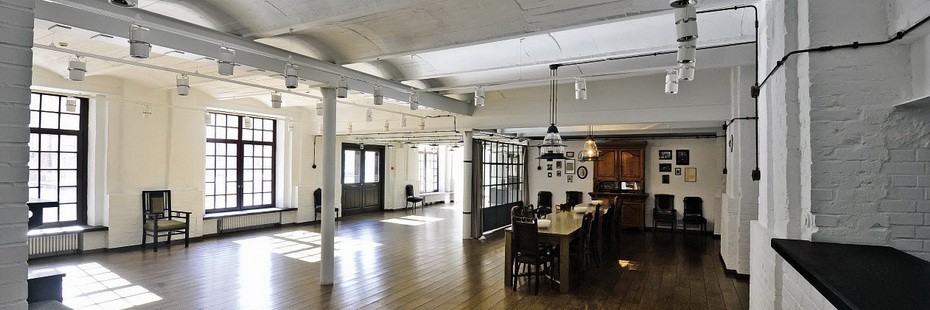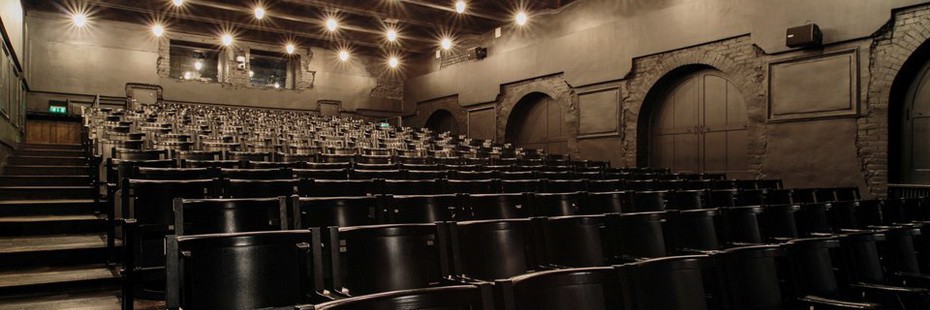Sergei Zhenovach already helped build one of Moscow’s, and Russia’s, most popular theaters — the Pyotr Fomenko Studio. He taught the students who later became the backbone of Fomenko’s now-famed troupe. Now Zhenovach is doing it again — guiding another group of students down the perilous road to professionalism. Only this time the students and the theater, the Studio of Theatrical Art, are Zhenovach’s own.
The theater became a professional entity last year, although it still is homeless. The troupe performs its shows at various venues around town while the construction of its new building continues near Taganka Square. Zhenovach says he hopes the venue will open its doors next fall, but he isn’t wasting time dreaming about a rosy future. He is also keeping his actors hopping. In recent months, he has resurrected and recalibrated two former student productions and added them to the theater’s repertoire. The latest, originally staged several years ago as a second-year exercise, is a dramatization of Ivan Goncharov’s classic 19th-century novel, “Oblomov.” As adapted and directed by German Sidakov, the show is called “Ob-lo-mov-shchina,” an untranslatable word that implies everything involving Oblomov is a muddle and a mess.
Zhenovach has put together an appealing group of young men and women. And under his tutelage, they have learned to bring sincerity, vulnerability, subtlety and youthful energy to the stage. In a sense, they look strikingly old-fashioned because they never betray so much as a whit of that inevitable attribute of modern life — cynicism. On the other hand, their confidence and faith in what they are doing is so strong and natural, they seem prepared to establish their own notion of what is fashionable and what is not.
Sidakov highlighted an aspect of Goncharov’s novel that suits the young actors well — its reference to Oblomov’s childhood. Oblomov is one of the key emblems of Russian culture and society. He is a man ill-equipped to lead a productive life. He is lazy, says the myth. He is incapable of being a functioning member of society. Sidakov does not overturn the myth, but sheds new light on it by approaching it through Oblomov’s early years.
We first see Oblomov (Sergei Abroskin) in what appears to be a moment of reverie. He dreamily sits by a window as a covey of women lovingly sing and bill and coo over an infant in swaddling. The infant is Oblomov himself. Perhaps we are witnessing Oblomov recalling his past, or perhaps this scene is an attempt on Sidakov’s part to achieve the cinematic effect of juxtaposing two different time frames in one and the same instant. Ultimately, the motivation for the scene is less important than its effect — we perceive Oblomov in his entirety at any given moment, as an infant and as an adult simultaneously. Scenes of Oblomov in his youth are repeated throughout the show, reminding us that Oblomov is never more than a thought away from the people and the circumstances that formed him.
Pampered by his mother (Maria Shashlova) and doted on by his nanny (Olga Kalashnikova), Oblomov is brought into a world buffered from conflict, competition and challenge. When he is confronted with these features of adult life, he does not know how to deal with them. The dangers he faces are muted, such as one recurring instance when he goes missing and the women scurry around looking for him. “I’m right here,” the adult Oblomov says forlornly to the women who do not see him.
But this is the background and the underpinning to the main story that primarily follows Oblomov through his friendship with the positive-thinking Andrei Stolz (Andrei Shibarshin), his frustrated battles with his crusty servant Zakhar (Alexei Vertkov), an aborted engagement to the lovely Olga (Tatyana Volkova) and a marriage of sorts to his quiet landlady Agafya (Kalashnikova, adding impressive nuances to her interpretation of Oblomov’s nanny).
As interpreted by Abroskin, this Oblomov is not the emotionally handicapped figure we usually associate with Goncharov’s most famous character. Brought up in an atmosphere of love and trust, he is a hothouse flower, exotic and unlike anything in the natural world. But he knows his own worth. He is a man of principle, and he does not believe in the principles that that hold together the society around him. He is no rebel; he does not wish to undermine or even criticize society. But he has no doubt that he has every right to live his life as he sees fit.
Naturally, there is a long moment of temptation, or there would be no story, no life and no art here.
Oblomov jests with his friend Stolz about having a wife and family someday, but he knows he’s not cut out for any such thing. Stolz, however, considers it his duty to make Oblomov a full-fledged member of the community at large and resolves to test his friend by introducing him to the beautiful and talented Olga. Musical, spiritual and understanding, she is everything a young man might dream of. Even against his own wishes and best instincts, Oblomov falls in love with her and proposes marriage.
Abroskin and Volkova play the awkward scenes of falling in love with great taste, humor and sensitivity. Even while falling under Olga’s considerable spell, Abroskin’s Oblomov retains his quirky individuality and refuses to play the game of love by the common rules. Volkova’s Olga tries to flow and bend with the circumstances. But she bristles when Oblomov offends her and breaks down when she realizes she has not kept this strange, but intriguing, man to herself.
More to Oblomov’s liking is Agafya, the landlady at an apartment into which he moves. Once again, Sidakov reshuffles the usual interpretation of Goncharov’s novel. If we are accustomed to seeing Agafya as a dumpy, sexless woman who poses no threat to Oblomov’s autonomy, this production presents her as wise and slyly attractive. As played by Kalashnikova, Agafya captures Oblomov’s fancy where Olga cannot, in part because she makes no demands on him and in part because she is worthy of him. Their union succeeds because Agafya accepts him as he is.
Be that as it may, Oblomov’s existence is a lonely one. This is reflected in the set designed by Maria Utrobina. A wall of windows crossing the entire stage opens onto a garden of dry, perhaps dead, plants. The only times a sensation of life comes to the garden is when lighting designer Yevgeny Vinogradov washes it in bright light and deep shadow. But there is something about the garden, like the society that Oblomov shuns so stubbornly, that seems out of touch and alien. Oblomov is more comfortable inside with the piles of pillows that soften his blow when plopping down on the floor.
“Ob-lo-mov-shchina” is a sensitive and touching work that suggests there are two sides to loneliness and alienation. Oblomov may look a fool in the eyes of the world, but he is a man who maintains his integrity to the end. Maybe there are fates worse than being misunderstood.
вся пресса





